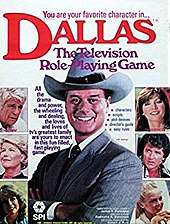Dallas (role-playing game)

Dallas is a role-playing game published by Simulations Publications, Inc. in 1980.
Description
Dallas is a TV soap-opera/crime system in which the PCs are major characters from the Dallas series interacting in "plots."[1] Character abilities include power, persuasion, coercion, seduction, investigation, and luck; ability scores are compared and dice are rolled to determine the results of actions.[1] The game includes the "Rules of Play" (16 pages), "Major Characters" booklet (16 pages), and the "Scriptwriter's Guide" (16 pages) for the GM, plus dozens of minor characters on cut-apart cards.[1]
Publication history
Dallas was designed by James F. Dunnigan, with art by Redmond A. Simonsen, and published by Simulations Publications, Inc. in 1980 as a boxed set containing three 16-page books, two sheets of cards, and dice.[1]
In an attempt to expand its customer base even further beyond the "hobbyist" core, SPI entered into a much-publicized arrangement with Lorimar Productions to produce the Dallas role-playing game based on the soap opera Dallas in 1980.[2] Dallas: The Television Role-Playing Game was the first ever licensed role-playing game.[3]:99 The game proved to be an infamous failure, and Simonsen later remarked that the 80,000 copies printed were 79,999 too many.[2]
Reception
David Ladyman reviewed Dallas: The Television Role-Playing Game in The Space Gamer No. 42.[4] Ladyman commented that "Is Dallas a useful bridge between gaming and your 'real world' friends? That might depend on how many Dallas freaks you know that you would want to introduce to gaming. Hard core RPGers will probably want to add the game to their collection; characters' attributes and the conflict resolution system are novel enough, even if you have no interest in the television series. I wouldn't suggest it, though, if you buy your games for long-term playability - Dallas just doesn't have lasting entertainment value."[4]
Lawrence Schick comments: "As much a card game as a role-playing game, it was widely loathed by SPI's devoted following of wargamers."[1]
Daniel Mackay, in his book The Fantasy Role-Playing Game: A New Performing Art, notes this game as an example of an unsuccessful licensed role-playing game.[5]
References
- 1 2 3 4 5 Schick, Lawrence (1991). Heroic Worlds: A History and Guide to Role-Playing Games. Prometheus Books. p. 262. ISBN 0-87975-653-5.
- 1 2 Simonsen, Redmond. "Why Did SPI Die".
- ↑ Shannon Appelcline (2011). Designers & Dragons. Mongoose Publishing. ISBN 978-1-907702-58-7.
- 1 2 Ladyman, David (August 1981). "Capsule Reviews". The Space Gamer. Steve Jackson Games (42): 28.
- ↑ Mackay, Daniel (2001). The Fantasy Role-Playing Game: A New Performing Art. McFarland. ISBN 9780786408153.